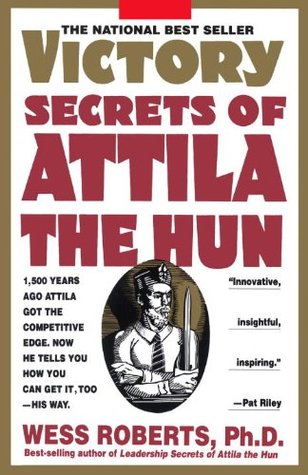Kindle Notes & Highlights
by
Wess Roberts
Read between
May 18 - November 10, 2018
Chieftains who meet their Huns’ needs—even at their own expense—are honorable leaders.
Secrets are exposed as soon as they are known to three Huns or to one Roman.
When chieftains suggest that a warrior or Hun compromise his or her beliefs, they are really asking the warrior or Hun to surrender integrity. Once such compromises begin, they become easier to suggest and harder to refuse.
Chieftains, warriors, and Huns who are vulgar and unpleasant gain neither trust nor respect.
• Chieftains don’t always know when they are doing the wrong thing. Even when they do know, they may be so caught up in the passions of the moment that they fail to consider the consequences of their wrongdoing. Therefore, chieftains need advisors they trust to remind them of the potential consequences of ill-considered actions.
The deepest scars a Hun bears are not of the body, but of the soul. Wounds to the body heal faster and more thoroughly than those inflicted on the soul—and they are less threatening to the good of the Hun, his or her tribe, and the nation.
Luck? Maybe. The result of well-thought-out and carefully executed plans? More likely.
Our calamity was a transient lapse in responsible leadership.
No chieftain, warrior, or Hun has many job assignments that are fun or frivolous. Most of what they do that provides long-term benefits for them or the tribe is tedious, difficult, and time-consuming.
As every superior skill a Hun develops can be turned into an asset, sensible chieftains insist that their Huns be trained by the best warriors.
Winning tribes are led by chieftains who understand that no tribe is lucky enough to meet only less well-led opponents.
For chieftain and warrior alike, not all distinction or booty is earned. So when you benefit from good fortune, don’t try to convince others that your advantage was earned by skill.
obstacles. But he recognized that his young leaders did not yet understand, as he did, that leading the Huns through their bad days—working hard under duress—is what a chieftain is compensated to do.
Putting off today’s decisions can ruin tomorrow.
Making excuses for not making decisions is a sign to the Huns that the chieftain is no longer in charge.
When a chieftain tells a Hun whose performance is substandard what he or she must do to meet expectations, it is a great day. When a chieftain fails to tell a poorly performing Hun how to meet expectations, it is a bad day. In the first instance, the Hun learns that the chieftain is not happy and what steps to take to make the chieftain happy. In the second instance, the Hun learns only that the chieftain is not happy.
Chieftains who surrender too early don’t understand that victory is often won late in battle. Winning chieftains don’t give up easily.
When chieftains recognize a threat to their tribes, they respond immediately—before their attention is diverted to lesser issues and their ability to act effectively is undermined.
Anticipation of the unexpected gives leaders a competitive edge.
Chieftains who believe they can’t influence events have, in fact, surrendered before the battle begins.
you are to be great, you must leverage your influence and accomplish the assignments I give you by enlisting the talents of your warriors.
Highly effective chieftains staff their tribes with warriors who outperform the warriors they replace.
• A promising Hun, dressed in the armor and equipped with the weapons of a warrior, soon begins to act and think like a warrior.
• Success as a Hun doesn’t guarantee success as a warrior. Success as a warrior doesn’t guarantee success as a chieftain. But mediocrity as a Hun guarantees failure as a warrior. And mediocrity as a warrior guarantees failure as a chieftain.
Overcompensated, underperforming chieftains find themselves surrounded by underperforming warriors who expect to be overcompensated.


